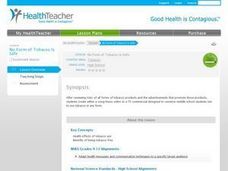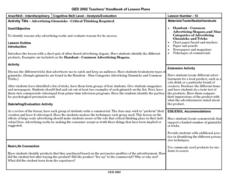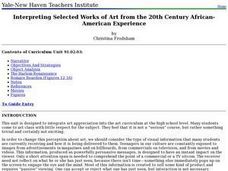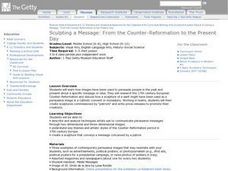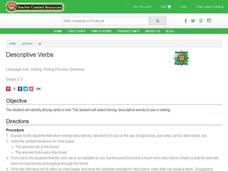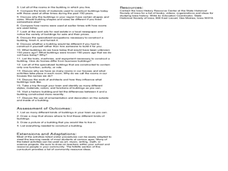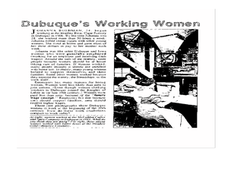Curated OER
Million Dollar Project
Students calculate how they will spend a million dollars. In this millionaire math activity, students complete a worksheet and then make a poster of how they would spend a million dollars. Each item and its cost must be...
Curated OER
Pitching Patriotism
Young scholars analyze the use of color, images and type used in print advertising, then "pitch" a company. They, in groups, brainstorm products and services of companies that may be affected by the war in Iraq.
Curated OER
The Who, What, and Y of Design
Students discover how large national chain stores create product lines that appeal to Generation-Y consumers. After learning in-depth about Target's new Dorm Room line, students create their own Generation-Y inspired product line.
Curated OER
The Clone Age
Young scholars relate the ethical and practical arguments in favor of cloning and against cloning. They research the issue and plan a public service advertisement campaign for or against cloning.
Curated OER
No Form of Tobacco is Safe
Students create an advertisement to convince children to stay away from tobacco products. In this smoking prevention lesson, students discuss the health effects of tobacco use and evaluate current tobacco ads. Students work in small...
Curated OER
Health Education: Advertising
Fourth graders become conscientious consumers. In this personal health lesson plan, 4th graders analyze techniques used in advertising health-related products and services.
Curated OER
Advertising Gimmicks - Critical Thinking Required
Young scholars identify reasons why advertising works, evaluate reasons for its success, and write commercials.
Curated OER
Food Webs
Students produce a newspaper covering topics related to food webs. They use print and electronic sources to gather information about specific animals. They share their information with the class.
Curated OER
The Reel World
Students explore the ways in which the New York Times column 'Taking the Kids' analyzes whether or not current movies are appropriate for different ages of Students. They explore past articles from the column and create movie posters.
Curated OER
Saving Face
Students research the allegations of unfair or illegal business practices of various corporations, then create media campaigns that seek to improve the companies' images.
Curated OER
Censorship in the Classroom: Understanding Controversial Issues
Students examine propaganda and media bias and explore a variety of banned and challenged books. Following this, students choose a side of the censorship issue and support their position by developing an ad campaign about the banned book...
Curated OER
Time is In
Analyze the influence of culture, media, technology, and other factors on health. High schoolers will identify and recognize propaganda techniques (glittering generalities, bandwagon, sex appeal, testimonial, transfer, etc.) and write a...
Curated OER
Interpreting Selected Works of Art from the 20th Century African-American Experience
Students examine pieces of art by African-American artists in the 20th Century. For each piece, they are shown slides of the artwork and others by the artist to identify the techniques used. In groups, they discuss and research the...
Curated OER
Teenage Boys: Perspectives on the Adolescent Male's Development in an Urban Setting
Students examine the effects of an urban setting on the development of male adolescence. After watching a film, they identify the problems in the relationship of the characters. They discuss the impact of becoming a teenage father and...
Curated OER
Advertising
Students explore the advantages/disadvantages of advertising and all it entails for the consumer. Public relations is examined in depth. In addition, media, slogans, promotion and elements of print and color are examined in detail.
Curated OER
Messages in Art Work
Observe images and discuss what messages they convey. In this critical thinking lesson plan, learners determine whether works of art are trying to persuade their audience. They also consider the media and how they communicate messages to...
Curated OER
Using Primary Sources to Discover Reconstruction
Fifth graders discover how reconstruction had an impact on racial issues in the United States. In this Reconstruction instructional activity, 5th graders are introduced to primary vs. secondary resources and then rotate through...
Curated OER
Sculpting a Message: From the Counter-Reformation to the Present Day
Students discuss persuasive messages in art. In this art history lesson, students research 17th- century European sculptures to find the messages given. They create their own sculptures and write press releases to explain their art.
Curated OER
From Greece to Main Street
Young scholars consider the influence of the Greeks on American architecture. For this American Greek Revival architecture lesson, students identify the attributes of architectural style as they compare the Parthenon with the Lincoln...
Curated OER
Descriptive Verbs
Young scholars read a piece of literature and locate the descriptive verbs in the piece. For this descriptive verbs lesson, students understand the value of using descriptive verbs. Young scholars rewrite a story they've written with...
Curated OER
Natural Resources
Learners explore Iowa geography and topographic maps. In this geography and topographic maps lesson, student investigate maps, newspapers, Iowa flora and fauna. Students gain an understanding of how different landforms can be identified...
Curated OER
Housing: Types of Shelters
Students experiment with the construction of shelters and the various types of architectural designs. In this shelters instructional activity, students draw the building they live in. Students compare and contrast buildings...
Curated OER
Badges of Pride
Fifth graders investigate jobs and how people identify with their job. In this labor lesson, 5th graders create a book from illustrations of various jobs. Students read an article about labor and answer questions about the article....
Curated OER
Revision is Part of the Writing Process: Peer Workshops
Twelfth graders go through the peer editing process by reading each other's work and talking about it. They realize revision is part of the process of writing poetry.




